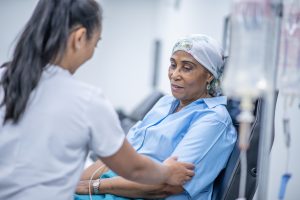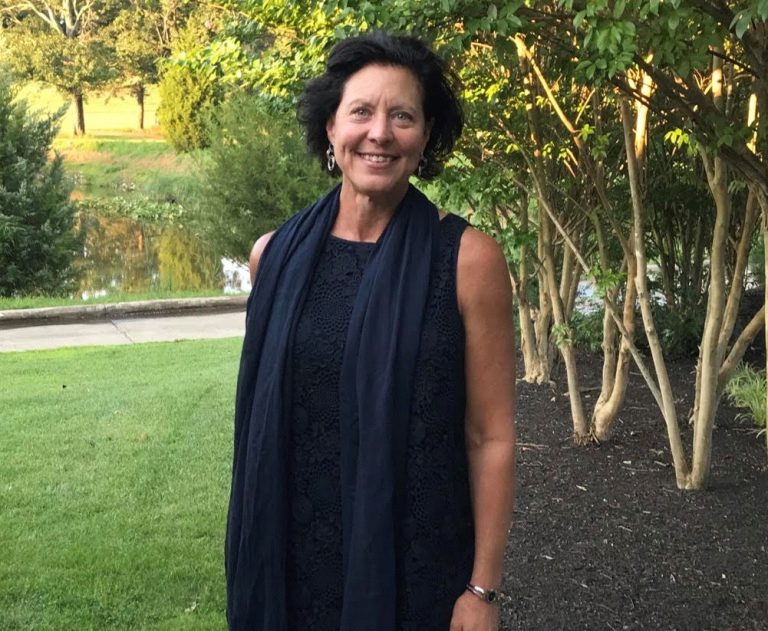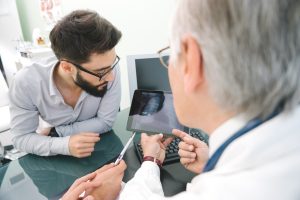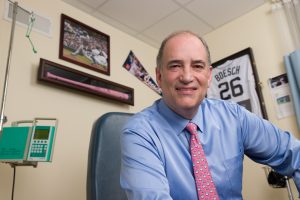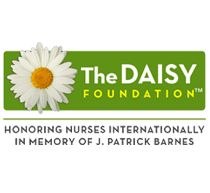She also credits Kenneth D. Nahum, DO, and the nurses and other team members working in his Howell, NJ office, with providing not only life-saving care but also life-affirming compassion and support. “I would never go anywhere else,” she said. A board-certified medical oncologist and hematologist with offices in Howell and Toms River, Dr. Nahum practices with Regional Cancer Care Associates (RCCA), one of the nation’s largest networks of oncology specialists.
Thompson’s path to Dr. Nahum’s office and care was a winding one, marked by COVID-related delays and a great need for the self-advocacy that she said is essential for all people facing cancer.
After detecting the lump in her breast, Ms. Thompson briefly deferred having it evaluated until she attended a family wedding in North Dakota. “Then I got back to New Jersey and the world had shut down” because of the coronavirus, she noted, explaining that it was several weeks before she could get an appointment with her OB/GYN.
“This is not good,” the gynecologist said on palpating the lump, confirming what Thompson already knew. She and her husband consulted an oncologist, who recommended that she have a mastectomy after first being treated with a long-established, powerful chemotherapy regimen that can cause cardiovascular problems later in life. Her husband had been treated with the same chemotherapy when he had cancer 20 years earlier and had suffered a massive heart attack two years before Thompson’s diagnosis.
Believing that there had to be newer, less-toxic treatment approaches available, Thompson did extensive research and chose to receive alternative therapy from a specialist in Manhattan. Findings from a positron emission tomography (PET) scan performed in September 2020 to assess her status after the start of that therapy were encouraging. Six months later, however, another imaging study showed that the original tumor had metastasized to two spots on the rib cage.
Straight Talk – and A Strong Endorsement
Upon learning that the cancer had spread, Thompson consulted a surgeon at Jersey Shore University Medical Center. The surgeon didn’t mince words. An operation wasn’t an option at that point. “You need to start chemotherapy, and you need to start it right now,” the surgeon said, adding, “I’m going to give you the name of the oncologist who, if it were me, I would go to.” The name the surgeon provided: Dr. Nahum.
“He was so kind,” Thompson said of her initial meeting with Dr. Nahum. She explained that when she asked about the potential cardiovascular and other side effects of chemotherapy, he listened intently, took her concerns seriously, and assured her that there were several steps he and his staff could take to mitigate the impact of treatment.
“He told me, ‘We’re going to be all over this,’ and they were. He sent me to a cardiologist for a baseline echocardiogram so they could monitor my heart health closely,” Thompson recalled, adding that throughout her care, Dr. Nahum and the office’s nurses have taken a highly individualized approach not only to providing treatment but also to preventing and managing side effects.
A Rooftop Call About Things Looking Up
In helping her husband run his roofing, window and siding business, it’s not unusual for Thompson to visit a job site to assess a project’s progress. It is unusual, however, for her to answer the phone when her work finds her perched on the roof of a building. But when her phone rang the day after her initial meeting with Dr. Nahum and she saw that it was his office calling, she answered despite her precarious position atop a house in Englishtown.
“It was Dr. Nahum. I told him where I was and asked if I could call him back. He explained that he had good news that would only take a minute to share. He said that the FDA had approved a new treatment for triple negative breast cancer earlier that day, and that his staff was already on the phone with my insurance company to get approval for him to treat me with it. It turns out that he had been one of the investigators in the clinical trial that led to the FDA approval, and he believed the treatment would be very beneficial for me. I thought to myself, ‘If he’s that excited about it, then I’m excited,’” she recalled.
The treatment was pembrolizumab (Keytruda), a type of immunotherapy known as a checkpoint inhibitor. These medications block proteins that stop the immune system from attacking cancer cells. In September 2014, the FDA approved pembrolizumab as a treatment for advanced melanoma. Based on further clinical trials, the FDA subsequently approved the immunotherapy to treat many other cancers, including, on the day Dr. Nahum called in July 2021, high-risk, early-stage triple negative cancer.
The ability to give pembrolizumab in combination with chemotherapy for triple negative breast cancer represented a major advance. Historically, the disease has been very difficult to treat for reasons relating to its description as “triple negative” breast cancer. Cancer cells usually have receptors on their surface that serve as biochemical “locks” that “open up” those cells to medications that act as keys. Most breast cancer cells have receptors for the hormone estrogen, the hormone progesterone or a protein called human epidermal growth factor 2 (HER2), making the cells responsive to hormonal therapies and other treatments. Breast cancer cells that lack those three receptors are termed “triple negative” and traditionally have been treated with chemotherapy due to the absence of targets for more specifically focused treatments.
Tailored Treatment and Compassionate Care
Two weeks after her rooftop conversation with Dr. Nahum, Thompson started treatment at his Howell office, receiving both chemotherapy and pembrolizumab. “I’m telling you, he really personalized my therapy. I just felt that I had a treatment plan that was totally tailored to me and my cancer,” including detailed instructions on how much water to drink each day and other steps to take to help minimize side effects.
Thompson also has high praise for the nurses and nurse practitioners in the office, citing the care provided by Phyllis Tarallo, NP, DNP, DCC, among others. ”They are cheerful. They are so delighted to see you that I actually looked forward to going for chemotherapy, even though I’m probably an odd duck” in that respect, she said. Thompson added, “Dr. Nahum has surrounded himself with very caring people. They’re kind, they’re compassionate and they take a real interest in you.”
That attention to the individual patient and her needs extends to the practice’s office staff, she added, noting that when her insurer initially balked at covering the just-approved pembrolizumab, Dr. Nahum’s office personnel “were tenacious. They wouldn’t take no for an answer.”
In mid-February 2022, Thompson finished her 16-cycle chemotherapy regimen, setting the stage for the next step in her treatment. “The whole goal of the chemotherapy was to reduce the size of the first tumor and the two on the rib cage to a point where they can be removed surgically,” she explained.
While the chemotherapy wasn’t without its challenges, Thompson said, “It’s been a walk in the park, really, because of all of my family, all of my friends, and the prayer support I’ve received, and largely because of Dr. Nahum, and his staff.” She added, “I have great faith that God brought me to Dr. Nahum.” Returning to her comment about the “lot of good” her diagnosis and treatment have brought her, Thompson pointed to the relationships she has forged with Dr. Nahum, his staff and her fellow patients, as well as the further strengthening of already strong bonds with family and friends.
Some Insights for Others
The American Cancer Society estimates that an average 5,205 people across the United States will receive a cancer diagnosis each day in 2022, including 152 people per day in New Jersey.
Looking back on her experience, Thompson advised people at the start of their cancer journey, “You always have a choice when you’re faced with this diagnosis. There are lots of choices out there. We live in an amazing country and at a great time in terms of what’s happening in medicine and what’s available. It can be overwhelming and a scary thing to have to make a choice, but if you do the research and find a caring doctor who really listens and works with you, like Dr. Nahum has with me, you can receive treatment tailored specifically to you and your needs.”
****
Dr. Nahum has been treating patients in Monmouth and Ocean counties for more than 20 years. He has served as a principal investigator in more than 120 clinical trials, and his areas of interest include breast cancer, gastrointestinal cancers, lung cancer and hematologic malignancies. He is a clinical associate professor at Robert Wood Johnson Medical School and the Cancer Institute of New Jersey. He also is a fellow of the American College of Physicians, and a member of the American Society of Hematology, American Society of Clinical Oncology and the Eastern Cooperative Oncology Group.
Dr. Nahum is among the 90+ cancer specialists who treat patients at more than 25 RCCA care centers located throughout New Jersey, Connecticut, Maryland and the Washington, D.C., area. RCCA oncologists and hematologists see more than 23,000 new patients each year and provide care to more than 225,000 established patients, collaborating closely with their patients’ other physicians. They offer patients the latest in cutting-edge treatments, including immunotherapies and targeted therapy, as well as access to a wide range of clinical trials. In addition to serving patients who have solid tumors, blood-based cancers and benign blood disorders such as anemia, RCCA care centers also provide infusion services to people with a number of non-oncologic conditions — including multiple sclerosis, Crohn’s disease, asthma and rheumatoid arthritis — who take intravenously-administered medications.
To learn more about RCCA, call 1-844-346-7222 or visit RCCA.com.
